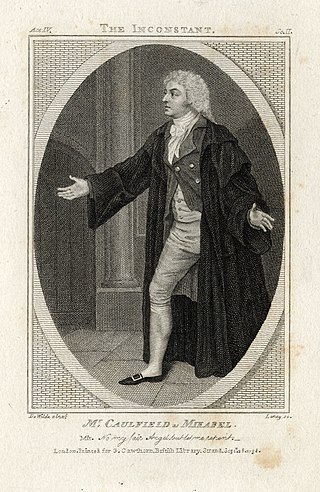Related Research Articles
Christopher Bullock (1690–1722) was a British stage actor and dramatist.
Theophilus Keene (1680–1718) was an Anglo-Irish stage actor and theatre manager.
John Mills (c.1670–1736) was a British stage actor. A long-standing part of the Drury Lane company from 1695 until his death, he appeared in both comedies and tragedies. His wife Margaret Mills was an actress, and his son William Mills also became an actor at Drury Lane.
James Lacy (1696-1774) was a British stage actor and theatre manager.
Henry Giffard (1694–1772) was a British stage actor and theatre manager.
Anna Marcella Giffard (1707–1777) was an Irish stage actress.
Sarah Hamilton was an Irish stage actress and singer of the eighteenth century.
Regulus is a 1744 tragedy by the British writer William Havard. It portrays the career of Marcus Atilius Regulus, a Roman Consul at the time of the First Punic War. It ran for seven performances during the season.
Richard Winstone (1699-1787) was a British stage actor of the eighteenth century.
William Mills (1701–1750) was a British stage actor.
John Sowdon was an Irish stage actor, singer and theater manager in the eighteenth century.
James Rosco was a British stage actor. His name is also written as James Roscoe.
Thomas Griffith (1680-1744) was an Irish stage actor and theatre manager.
Richard Cross was a British stage actor.
Richard Hurst was a British stage actor.
Luke Sparks (1711–1768) was an Irish stage actor of the eighteenth century.
Montague Talbot (1774–1831) was an Irish stage actor and theatre manager.

Thomas Caulfield (1766–1815) was a British stage actor who after a period in London's West End spent the later part of his career in the United States.
Howard Usher was an English stage actor of the eighteenth century. He had a lengthy career in London's West End beginning at Drury Lane during the 1739–1740 season. A member of the company, he played smaller, supporting roles in a large number of productions. He also acted at the London fairs during the summer and at Richmond in Surrey and the Jacobs Well Theatre in Bristol. In 1750 he moved to Covent Garden for four years, before returning to Drury Lane for a further four years in 1758. He then moved to Ireland where he spent a number of years at the Smock Alley Theatre and Crow Street Theatre in Dublin and also appeared at the Theatre Royal, Cork. By this time he was married to the actress Maria Usher who appeared with him in Dublin. In 1774 he was recruited by David Garrick to return to Drury Lane. In 1778 he joined the company at the Theatre Royal, Haymarket and remained part of it for the next twenty one years. His final appearance was a reprise of his original role Sir Walter Manny in George Colman the Younger's The Surrender of Calais on 10 September 1799.
William Davies (1751–1809) was an English stage actor and singer. Born in London, Davies began his career in the provinces including at Norwich before coming to Richmond Theatre in the summer of 1770. He made his London debut at the Theatre Royal, Drury Lane in September that year and joined the company which was under the management of David Garrick and later Richard Brinsley Sheridan. In 1780 he transferred to the company of the Theatre Royal, Covent Garden and remained there for the next fourteen years, interspersing it with summer appearances at the Haymarket where he continued to appear until 1799. He died in 1809 was buried at St Paul's Church in Covent Garden. His wife Elizabeth Davies also acted alongside him at Norwich and Drury Lane before her death in 1782.